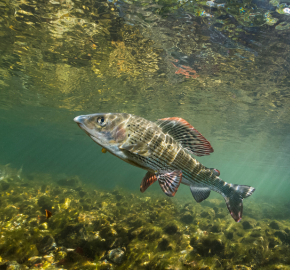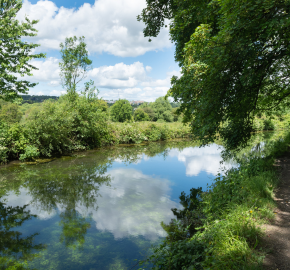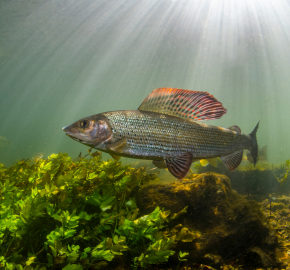Chalk Streams by David Profumo
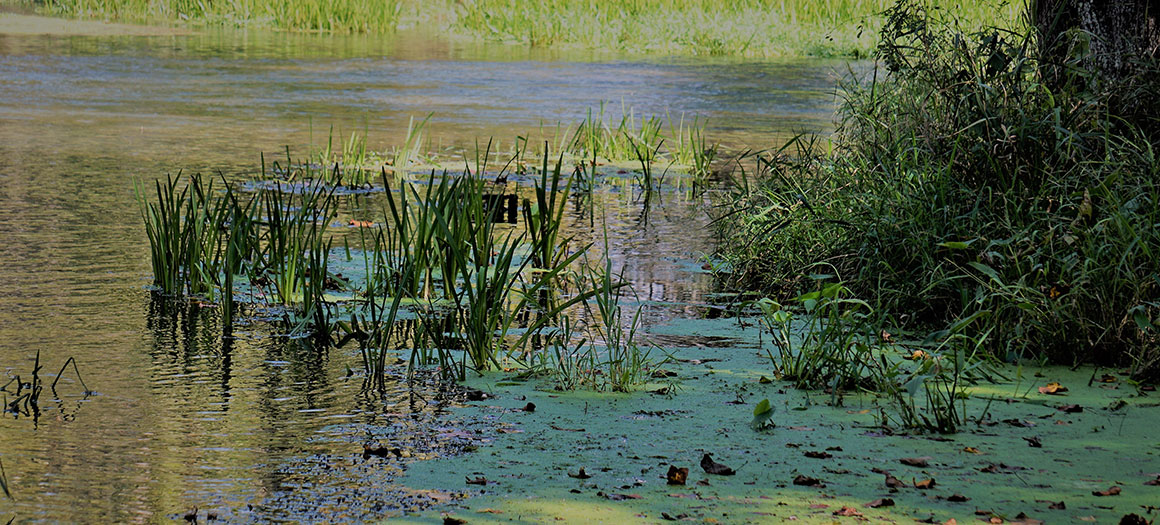
I was brought up on a stretch of chalk stream that nobody else fished, and even back then (in the late Sixties) I realised what a singular privilege this was.
The Rib – near Westmill, in Hertfordshire – ran through a dishevelled wood at the end of a pasture opposite our home. The river itself was less than kempt: no fly-boards, or nice footbridges upholstered with chicken wire, or even a path up its banks. You couldn’t wade, for all the treefalls. Its holt-like pools harboured a few long, lean wild brown trout, which I spent hundreds of teenage hours trying to deceive – occasionally with unorthodox methods.
If the Itchen is a love lyric by some Romantic versifier, this stream was a garbled diary entry by Hunter S. Thompson.
It kept me (mostly) out of trouble during certain crucial years; and it also imbued me with five decades of being in thrall to the charm – or should that be ‘the glamour’ (as in love spell)? – of chalk country. I have now fished a fair few of the two hundred-plus such streams but have always had a penchant for the more minor waters. Dun, Dever, Chess and Misbourne have beguiled me with their spring-fed beauty, their gravel glimpses, and soft punctuations of green, their spilling and whispering, the peek they afford into another world entirely. And I have an abiding fondness for the life that thrives there, when all is well: starwort and milfoil, grayling and minnows, dippers, water voles and scudding shrimp – as the poet Auden wrote (in praise of Lakes) ‘Just reeling off their names is ever so comfy’.
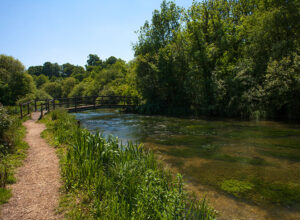
I have come to believe there is something else, slightly peculiar, about the appeal of chalk streams, too. It’s to do with their delicacy, that hint of glass-blown perfection and delight, a certain managed gentleness. They are, after all, partly human artefacts, which perhaps makes them all the more fragile and valuable. Subjectively, I associate them with the apparent pastoralism of England prior to the Great War, or the uncluttered milieu of The Wind in the Willows.
There is a mesmerised, slightly cross-eyed, body of literature that celebrates these waters (by Kingsley, Grey, Hills and Plunket Greene, for instance) which you don’t get from, say, the hydrodynamic celebration of Highland rivers and their hurly-burly, or indeed the heroics of billfish safaris, and the like. If I’m being fanciful, I might suggest chalk streams are good for the soul (though some of us by now may be beyond salvation). ‘Glory was in me,’ wrote John Betjeman, of his beloved Kennet. Well, what’s so wrong with a bit of that?
John Ruskin hymned the Wandle, back in 1870, for its ‘welling of stainless water, trembling and pure, like a body of light.’ These days, as we all know (though occasionally you must preach to the converted) all is not well in chalk country. Sometimes referred to as the English equivalent of the rain forests – though I prefer Dr. Janina Gray’s analogy of the imperilled coral reefs – there is a crisis that has recently been highlighted with admirable, and apt, clarity in the
Restoration Strategy of the Catchment Based Approach Chalk Streams publication.
It reminds us that these rare waters have for centuries been managed, harnessed, modified and exploited, but now (thanks to excessively thirsty British households) they need better protection, fast. The present ‘priority habitat status’ designation is not enough. There are ingenious and complex ways in which chalk streams can be enhanced or ‘mended’, but the will to implement such practices is not yet widespread.
This is symptomatic of an inexplicable national attitude towards the provision of good, clean water in quantity and quality. Fewer than one in five of our English rivers are considered to be in an acceptable ecological state. Is it because we covertly subscribe to the myth that we inhabit a soaking wet island, and that therefore Nature always remedies itself? Setting aside the disgraceful whipping of MPs to vote down that amendment to the Environment Bill, or the outrageous claims from some of our privatised Water Companies (who continue to dump untreated sewage into our waterways on a Third World scale).
what will future generations make of our failure to curb pollution and abstraction, the lack of investment in reservoirs to reconcile these new cycles of drought and inundation?
If chalk streams don’t matter, there is not much hope for the future of the more unlovely parts of our British environment. Right now, I can’t think of a better call to arms than this.
We can’t just invent fresh, clean water – and we can not allow our chalk streams to die of thirst.
David Profumo is the Fishing Correspondent for ‘Country Life’ magazine, and author of a recent memoir The Lightning Thread. Fishological Moments and the Pursuit of Paradise. (Published by Scribner).

